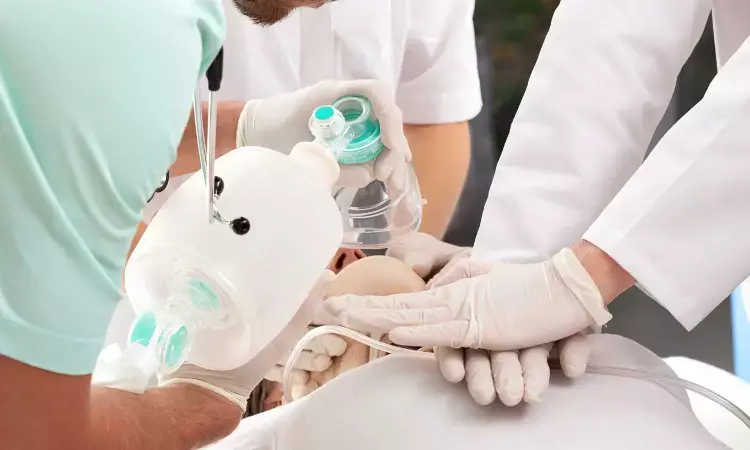- Home
- Medical news & Guidelines
- Anesthesiology
- Cardiology and CTVS
- Critical Care
- Dentistry
- Dermatology
- Diabetes and Endocrinology
- ENT
- Gastroenterology
- Medicine
- Nephrology
- Neurology
- Obstretics-Gynaecology
- Oncology
- Ophthalmology
- Orthopaedics
- Pediatrics-Neonatology
- Psychiatry
- Pulmonology
- Radiology
- Surgery
- Urology
- Laboratory Medicine
- Diet
- Nursing
- Paramedical
- Physiotherapy
- Health news
- Fact Check
- Bone Health Fact Check
- Brain Health Fact Check
- Cancer Related Fact Check
- Child Care Fact Check
- Dental and oral health fact check
- Diabetes and metabolic health fact check
- Diet and Nutrition Fact Check
- Eye and ENT Care Fact Check
- Fitness fact check
- Gut health fact check
- Heart health fact check
- Kidney health fact check
- Medical education fact check
- Men's health fact check
- Respiratory fact check
- Skin and hair care fact check
- Vaccine and Immunization fact check
- Women's health fact check
- AYUSH
- State News
- Andaman and Nicobar Islands
- Andhra Pradesh
- Arunachal Pradesh
- Assam
- Bihar
- Chandigarh
- Chattisgarh
- Dadra and Nagar Haveli
- Daman and Diu
- Delhi
- Goa
- Gujarat
- Haryana
- Himachal Pradesh
- Jammu & Kashmir
- Jharkhand
- Karnataka
- Kerala
- Ladakh
- Lakshadweep
- Madhya Pradesh
- Maharashtra
- Manipur
- Meghalaya
- Mizoram
- Nagaland
- Odisha
- Puducherry
- Punjab
- Rajasthan
- Sikkim
- Tamil Nadu
- Telangana
- Tripura
- Uttar Pradesh
- Uttrakhand
- West Bengal
- Medical Education
- Industry
Faster CPR Saves Lives: Delay Beyond 4 Minutes Reduces Survival in Out-of-Hospital Cardiac Arrest, Study Finds

Singapore: A recent study published in the Resuscitation Journal has revealed that the time it takes to begin dispatcher-assisted cardiopulmonary resuscitation (DA-CPR) plays a crucial role in determining survival outcomes following out-of-hospital cardiac arrest (OHCA). Led by Dr. Haruka Takahashi from the Health Services & Systems Research department at Duke-NUS Medical School, Singapore, the research highlights the importance of rapid intervention during medical emergencies.
Drawing on data from the Singapore Pan-Asian Resuscitation Outcomes Study between 2012 and 2021, the researchers analyzed 3,861 adult patients who experienced witnessed, non-traumatic OHCA and received DA-CPR. The study focused on assessing how delays in starting CPR, after the emergency call was made, influenced the chances of survival with favorable neurological outcomes at 30 days.
For the analysis, patients were categorized into three groups based on how long it took to initiate CPR: short (0–179 seconds), medium (180–239 seconds), and long (240 seconds or more).
The study led to the following findings:
- Patients who experienced a delay of four minutes or more in initiating dispatcher-assisted CPR were significantly less likely to survive with favorable neurological outcomes.
- The odds of such survival dropped by 37% when CPR began after four minutes of the emergency call, with an adjusted odds ratio (aOR) of 0.63.
- The group with a moderate delay (3–4 minutes) also showed reduced survival odds, though the association was not statistically significant (aOR 0.82).
- A restricted cubic spline analysis demonstrated a steady decline in the likelihood of survival with favorable neurological outcomes as the delay in starting DA-CPR increased.
The study strongly suggests that every second counts in the critical moments following a cardiac arrest. Early initiation of CPR, particularly with dispatcher guidance, can make a substantial difference in saving lives and preserving brain function.
“These findings highlight the urgent need to streamline dispatcher response systems and reduce the time it takes to initiate CPR instructions over the phone,” the researchers noted. They emphasize that optimizing dispatcher protocols, training, and public awareness could significantly improve outcomes for OHCA patients.
The research adds to the growing body of evidence supporting the life-saving potential of rapid DA-CPR. It calls for emergency services around the world to prioritize faster response mechanisms to ensure bystanders can act swiftly under dispatcher guidance.
In conclusion, reducing the time between emergency calls and the commencement of dispatcher-assisted CPR is not just a logistical goal—it’s a matter of life and neurological integrity for cardiac arrest victims. Prompt action in those first few minutes may be the key to survival.
Reference:
Takahashi, H., Okada, Y., Hong, D., Quah, D., Leong, B. S., Ng, Y. Y., Shahidah, N., Goh, G. S., Yazid, M., Suzuki, K., Neumar, R. W., & Ong, M. E. (2025). Association between time taken to start Dispatch Assisted-Bystander Cardiopulmonary Resuscitation (DA-CPR) and outcomes for Out-of-Hospital Cardiac Arrest (OHCA). Resuscitation, 110651. https://doi.org/10.1016/j.resuscitation.2025.110651
Dr Kamal Kant Kohli-MBBS, DTCD- a chest specialist with more than 30 years of practice and a flair for writing clinical articles, Dr Kamal Kant Kohli joined Medical Dialogues as a Chief Editor of Medical News. Besides writing articles, as an editor, he proofreads and verifies all the medical content published on Medical Dialogues including those coming from journals, studies,medical conferences,guidelines etc. Email: drkohli@medicaldialogues.in. Contact no. 011-43720751


